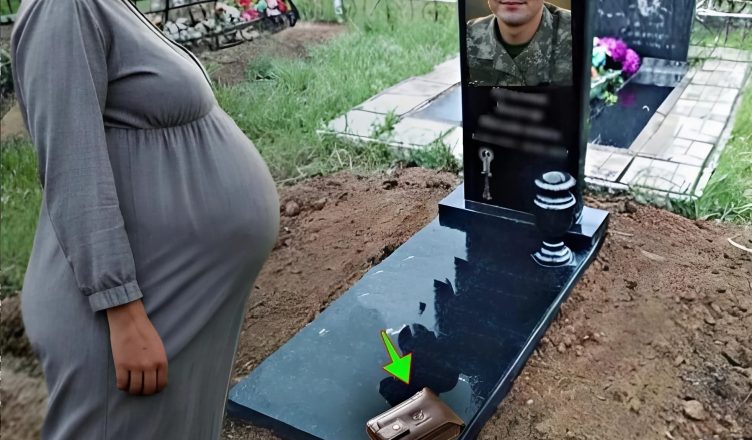The top photograph was black and white, faded, and creased with time. A young woman smiled shyly at the camera, holding the arm of a man in a soldier’s uniform. The man looked familiar. Not personally — Yulia had never seen him before — but there was something in his eyes. Determination, perhaps. Or quiet defiance. She couldn’t explain it. But she felt it.
She looked around again, half-expecting someone to come sprinting toward her, claiming the bag. No one came.
Yulia sat on the cold stone edge of the nearest grave, her hunger momentarily forgotten. She opened the notebook. The first pages were filled with spidery handwriting, a mix of diary entries and letters. The name at the top: “To my son, when the time is right.”
The dates spanned decades. Some entries were written from hospitals. Others from faraway places — Chechnya, Luhansk, Crimea. The writer had been a soldier, and a father, recording every detail of a life spent in service, loss, and love.
https://googleads.g.doubleclick.net/pagead/ads?gdpr=0&us_privacy=1—&gpp_sid=-1&client=ca-pub-5852720820337435&output=html&h=280&adk=1097250889&adf=2455806847&pi=t.aa~a.1381849204~i.9~rp.4&w=747&abgtt=6&fwrn=4&fwrnh=100&lmt=1748866025&num_ads=1&rafmt=1&armr=3&sem=mc&pwprc=8915400646&ad_type=text_image&format=747×280&url=https%3A%2F%2Fuus.arminfonews.ru%2F%3Fp%3D1918%26fbclid%3DIwY2xjawKqczhleHRuA2FlbQIxMABicmlkETFOTFFidlN4Tm5nb1ZrSDljAR62KI0UNq25gBlPRSPcG6wMTLd5mrXdwqIxdWU8deOJ3OU1o0iih-1vDkn-ig_aem_lSthk1y_BIpu-7tIctYNQQ&fwr=0&pra=3&rh=187&rw=746&rpe=1&resp_fmts=3&wgl=1&fa=27&uach=WyJXaW5kb3dzIiwiMTUuMC4wIiwieDg2IiwiIiwiMTM2LjAuMzI0MC45MiIsbnVsbCwwLG51bGwsIjY0IixbWyJDaHJvbWl1bSIsIjEzNi4wLjcxMDMuMTEzIl0sWyJNaWNyb3NvZnQgRWRnZSIsIjEzNi4wLjMyNDAuOTIiXSxbIk5vdC5BL0JyYW5kIiwiOTkuMC4wLjAiXV0sMF0.&dt=1748866024864&bpp=1&bdt=1114&idt=-M&shv=r20250528&mjsv=m202505270101&ptt=9&saldr=aa&abxe=1&cookie=ID%3D25974f79dff08e83%3AT%3D1748866025%3ART%3D1748866025%3AS%3DALNI_May1K_jOlB9sCuLRqm0-RgPaJPa_A&gpic=UID%3D000010ccdf3cddf4%3AT%3D1748866025%3ART%3D1748866025%3AS%3DALNI_MbG0Gvdt70jrYJi5nhvNYwfB1T8mQ&eo_id_str=ID%3Ddbd512faa500e7f7%3AT%3D1748866025%3ART%3D1748866025%3AS%3DAA-AfjZuRYBxEgkm_9ATJvLAOnEw&prev_fmts=0x0%2C747x280%2C747x280%2C747x280&nras=2&correlator=2043748103396&rume=1&frm=20&pv=1&u_tz=120&u_his=1&u_h=1080&u_w=1920&u_ah=1032&u_aw=1920&u_cd=24&u_sd=1&dmc=8&adx=379&ady=1857&biw=1897&bih=954&scr_x=0&scr_y=267&eid=31092114%2C31092757%2C31092783%2C95353387%2C95360390%2C95360812%2C95361620%2C95362171%2C31061691%2C31061693&oid=2&psts=AOrYGsn-44IUcBdhuLkIOmvEYGbdocqAGRVUXie3eokHw7iYjWhGUz2p51TEQJT23XtmShOkT5yrvVEx2usUnjuOIYbbOADK&pvsid=7460724835600715&tmod=326863811&uas=0&nvt=1&ref=https%3A%2F%2Fl.facebook.com%2F&fc=1408&brdim=0%2C0%2C0%2C0%2C1920%2C0%2C1920%2C1032%2C1912%2C954&vis=1&rsz=%7C%7Cs%7C&abl=NS&fu=128&bc=31&bz=1&td=1&tdf=2&psd=W251bGwsbnVsbCxudWxsLDNd&nt=1&pgls=CAEaBTYuOC4x&ifi=5&uci=a!5&btvi=3&fsb=1&dtd=228
It was a relic — not just of one man’s life, but of a country torn in two, healed, broken again, and still bleeding.
https://googleads.g.doubleclick.net/pagead/ads?gdpr=0&us_privacy=1—&gpp_sid=-1&client=ca-pub-5852720820337435&output=html&h=280&adk=1097250889&adf=3067773278&pi=t.aa~a.1381849204~i.11~rp.4&w=747&abgtt=6&fwrn=4&fwrnh=100&lmt=1748866025&num_ads=1&rafmt=1&armr=3&sem=mc&pwprc=8915400646&ad_type=text_image&format=747×280&url=https%3A%2F%2Fuus.arminfonews.ru%2F%3Fp%3D1918%26fbclid%3DIwY2xjawKqczhleHRuA2FlbQIxMABicmlkETFOTFFidlN4Tm5nb1ZrSDljAR62KI0UNq25gBlPRSPcG6wMTLd5mrXdwqIxdWU8deOJ3OU1o0iih-1vDkn-ig_aem_lSthk1y_BIpu-7tIctYNQQ&fwr=0&pra=3&rh=187&rw=746&rpe=1&resp_fmts=3&wgl=1&fa=27&uach=WyJXaW5kb3dzIiwiMTUuMC4wIiwieDg2IiwiIiwiMTM2LjAuMzI0MC45MiIsbnVsbCwwLG51bGwsIjY0IixbWyJDaHJvbWl1bSIsIjEzNi4wLjcxMDMuMTEzIl0sWyJNaWNyb3NvZnQgRWRnZSIsIjEzNi4wLjMyNDAuOTIiXSxbIk5vdC5BL0JyYW5kIiwiOTkuMC4wLjAiXV0sMF0.&dt=1748866024864&bpp=1&bdt=1115&idt=-M&shv=r20250528&mjsv=m202505270101&ptt=9&saldr=aa&abxe=1&cookie=ID%3D25974f79dff08e83%3AT%3D1748866025%3ART%3D1748866025%3AS%3DALNI_May1K_jOlB9sCuLRqm0-RgPaJPa_A&gpic=UID%3D000010ccdf3cddf4%3AT%3D1748866025%3ART%3D1748866025%3AS%3DALNI_MbG0Gvdt70jrYJi5nhvNYwfB1T8mQ&eo_id_str=ID%3Ddbd512faa500e7f7%3AT%3D1748866025%3ART%3D1748866025%3AS%3DAA-AfjZuRYBxEgkm_9ATJvLAOnEw&prev_fmts=0x0%2C747x280%2C747x280%2C747x280%2C747x280&nras=3&correlator=2043748103396&rume=1&frm=20&pv=1&u_tz=120&u_his=1&u_h=1080&u_w=1920&u_ah=1032&u_aw=1920&u_cd=24&u_sd=1&dmc=8&adx=379&ady=2185&biw=1897&bih=954&scr_x=0&scr_y=267&eid=31092114%2C31092757%2C31092783%2C95353387%2C95360390%2C95360812%2C95361620%2C95362171%2C31061691%2C31061693&oid=2&psts=AOrYGsn-44IUcBdhuLkIOmvEYGbdocqAGRVUXie3eokHw7iYjWhGUz2p51TEQJT23XtmShOkT5yrvVEx2usUnjuOIYbbOADK&pvsid=7460724835600715&tmod=326863811&uas=0&nvt=1&ref=https%3A%2F%2Fl.facebook.com%2F&fc=1408&brdim=0%2C0%2C0%2C0%2C1920%2C0%2C1920%2C1032%2C1912%2C954&vis=1&rsz=%7C%7Cs%7C&abl=NS&fu=128&bc=31&bz=1&td=1&tdf=2&psd=W251bGwsbnVsbCxudWxsLDNd&nt=1&pgls=CAEaBTYuOC4x&ifi=6&uci=a!6&btvi=4&fsb=1&dtd=231
Yulia closed the book gently. Her stomach growled, a sharp reminder of her own fight for survival, but the hunger now felt dulled compared to the ache building in her chest. This bag hadn’t been forgotten. It had been placed here deliberately — under this bench, near this grave. A silent message, or maybe a gift, left for someone who never came.
Suddenly, a question struck her with unusual clarity: What if this was her task? What if fate — or whatever cruel joke the world played — had brought her here not for food, but for this?
She took the bag and walked away from the grave, carefully avoiding the eyes of the living and the dead. Back in her temporary shelter — an abandoned service shack behind a shuttered metro entrance — she began to read the notebook properly, by the flicker of a half-dead flashlight. The words pulled her in. The man’s voice was calm, steady, unfiltered. He spoke of fear and duty, of nights under mortar fire, and the agony of hearing news from home he couldn’t change.

He wrote of a son he hadn’t seen in years. A son who might never know the full truth. A son, perhaps, who never wanted to.
Yulia couldn’t help but cry. Not for the man, not for the war — she had seen enough of both to be numbed. She cried for the child inside her, for the uncertainty he or she would be born into, and for the parallel lives they might both live — hers, a continuation of forgotten people scraping by, and this unborn one, still untouched by the world’s weight.
Over the next few days, Yulia became obsessed. She carried the notebook everywhere, studied every photo, even rubbed the medal clean. She returned to the cemetery, hoping to see someone who recognized the face. No one ever came.
But she changed.
She stopped collecting food from graves. Instead, she took small jobs: sweeping in a bakery at dawn, carrying crates in the market in exchange for bruised apples and hard bread. She made just enough to survive. Somehow, it felt better. More real.
She showed the photograph to the old man who ran a kiosk near the cemetery gates. He squinted, nodded slowly, and said he thought the soldier was called Lev. “A real patriot,” he added. “Quiet. Came every month to see his wife’s grave. Haven’t seen him in over a year.”
A lead. She followed it, walking the neighborhoods, asking questions. Most shrugged. A few remembered the name. One woman said he died last winter — cold, pneumonia, no family.
The trail ended at a crumbling apartment block in the outskirts of Kyiv. She sat on the steps outside, unsure why she’d come. But inside her coat, she still carried the notebook. And she knew she had to pass it on. Even if the son no longer existed, or never had — someone needed to remember.
Weeks passed. Her belly swelled. Summer became autumn. One day, at a local shelter where she’d been volunteering to sweep floors for warm meals, she read the man’s letters aloud to others. Veterans, displaced women, children with eyes too old for their age. They listened. Some cried.
The notebook found a new purpose — not as a personal artifact, but as a piece of shared memory. A legacy.
And Yulia found hers. When she gave birth in a public hospital with peeling walls and kind, overworked nurses, she named her son Lev.
Not because she knew the man. Not because of some sentimental attachment. But because that name had once belonged to someone who didn’t give up — not on his country, not on his child, not even in death.
Her son would have something stronger than money or food left on gravestones.
He would have a story.
And that story — though born of war, loss, and hunger — would carry the fierce, quiet light of
